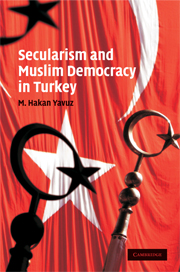Book contents
- Frontmatter
- Contents
- Preface
- Abbreviations
- Map of Turkey
- Introduction: what is an Islamic party? Is the AKP an Islamic party?
- 1 Historical and ideological background
- 2 Political and economic origins of the AKP: opportunity spaces and the backlash of February 28, 1997
- 3 Ideology, leadership and organization
- 4 Kabadayı and mağdur: Erdoğan and Gül
- 5 Modes of secularism
- 6 The Kurdish question and the AKP
- 7 The foreign policy of the AKP
- 8 The political crisis and the 2007 elections
- Conclusion: the end of dual sovereignty and the creole political language
- Bibliography
- Index
- CAMBRIDGE MIDDLE EAST STUDIES 28
3 - Ideology, leadership and organization
Published online by Cambridge University Press: 05 June 2012
- Frontmatter
- Contents
- Preface
- Abbreviations
- Map of Turkey
- Introduction: what is an Islamic party? Is the AKP an Islamic party?
- 1 Historical and ideological background
- 2 Political and economic origins of the AKP: opportunity spaces and the backlash of February 28, 1997
- 3 Ideology, leadership and organization
- 4 Kabadayı and mağdur: Erdoğan and Gül
- 5 Modes of secularism
- 6 The Kurdish question and the AKP
- 7 The foreign policy of the AKP
- 8 The political crisis and the 2007 elections
- Conclusion: the end of dual sovereignty and the creole political language
- Bibliography
- Index
- CAMBRIDGE MIDDLE EAST STUDIES 28
Summary
In August 2001, the reformist and younger sector of the FP, led by Abdullah Gül, formed the AKP with the support of the rising Anatolian bourgeoisie. Adalet ve Kalkınma Partisi (Justice and Development Party) is also called Ak Parti meaning the “pure” or “uncontaminated” party to differentiate itself from the other political parties, which were allegedly involved in widespread corruption before the 2002 elections. The party committed itself not to use Islam for political purposes and ended its confrontational policies. To the surprise of many observers, although the AKP emerged out of the Islamic political movement, it is pro-European and tolerant of diversity. Due to the collapse of the government in 2002, the newly formed AKP found itself in the midst of an election on November 3 of the same year. A little more than a year after its foundation, the party received 34% of the votes and won 363 seats out of a total of 550 parliamentary seats – a near two-thirds majority of seats. Kutan's Saadet Partisi (SP) (Felicity Party) received a mere 3% of the votes in the same election.
The 2002 election victory of the AKP can be explained by a convergence of factors. Widespread popular dissatisfaction with the economy and political parties encouraged many people either not to vote or to vote against the existing parties and try the untested AKP instead.
- Type
- Chapter
- Information
- Secularism and Muslim Democracy in Turkey , pp. 79 - 117Publisher: Cambridge University PressPrint publication year: 2009

